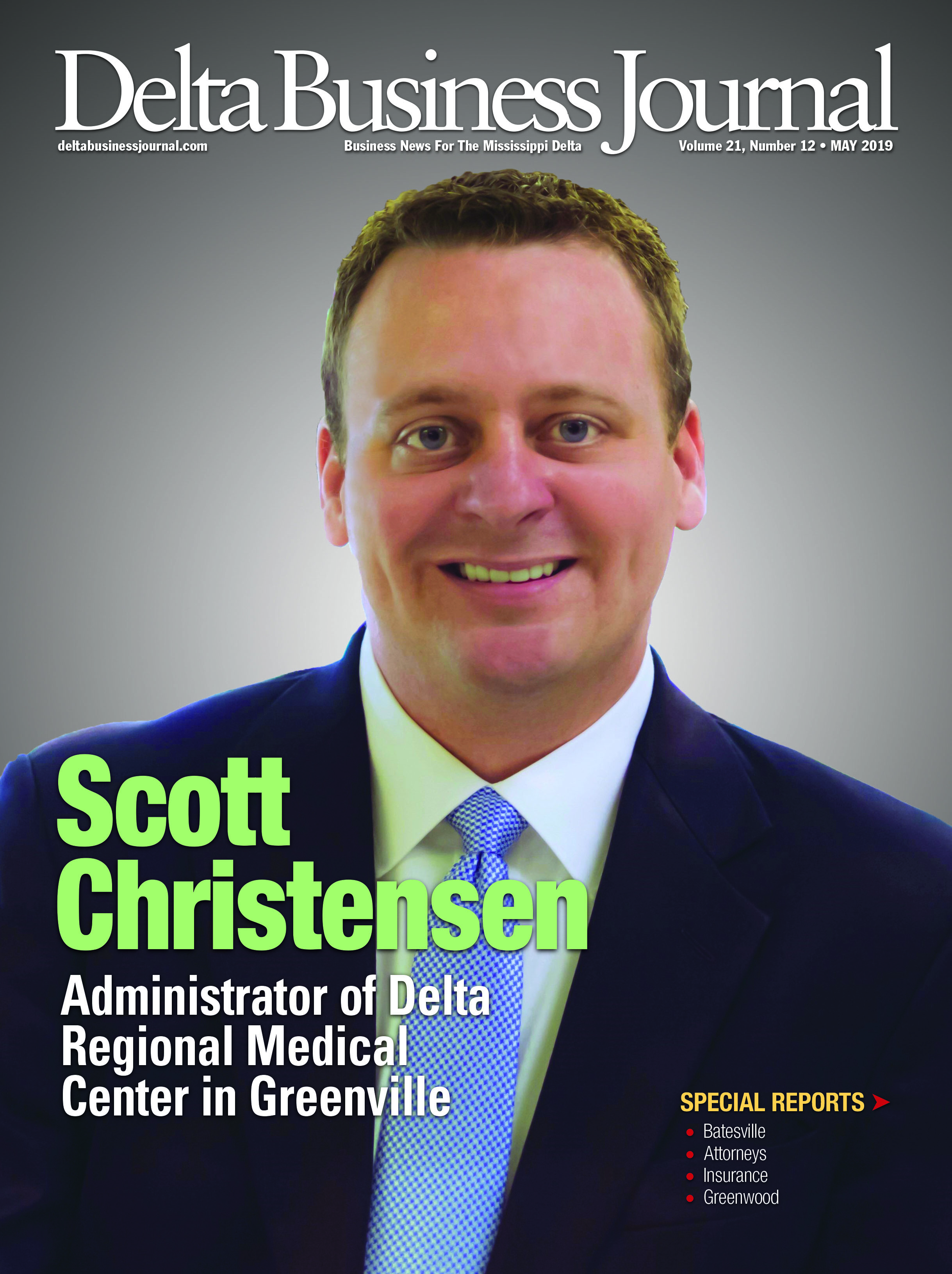By Becky Gillette • Photography by Kevin Willis
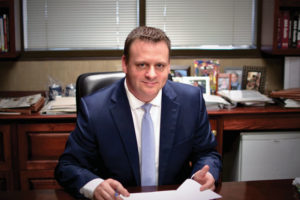 It is no secret that it is a challenging environment today for healthcare. That is particularly true in economically challenged areas. Delta Regional Medical Center (DRMC), the largest hospital in the Mississippi Delta, provides about $25 million per year in free medical care. With just under 1,000 employees, the hospital also has a tremendous positive economic impact.
It is no secret that it is a challenging environment today for healthcare. That is particularly true in economically challenged areas. Delta Regional Medical Center (DRMC), the largest hospital in the Mississippi Delta, provides about $25 million per year in free medical care. With just under 1,000 employees, the hospital also has a tremendous positive economic impact.
DRMC Administrator Scott Christensen, FACHE, is keenly aware how important it is that the hospital deliver excellent healthcare while keeping the area’s largest employer financially stable. First and foremost, it is about taking care of people.
“This is a business where we are here at the beginning of life, we are here at the end of life, and for everything in between,” Christensen says. “As I and everyone on our team walk in to work, we are confronted with some of the most tragic, serious, and life-changing issues you could ever imagine, witnessing true heartbreak and sorrow, while at the same time experiencing the pure joy of saving someone’s life or the miracle of birth as we deliver more than 750 babies a year.”
His goal is to move DRMC and, hopefully the Delta, as well, from just surviving to thriving.
Rep. John Hines, Greenville, credits Christensen with stabilizing the hospital at a time when other hospitals were closing down or laying off employees.
“He is progressive and innovative in building partnerships,” Hines says. “Scott has found a way to stabilize the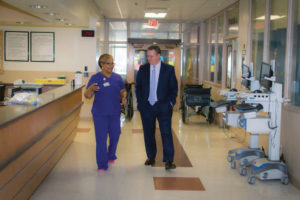 hospital and be an economic sparkplug for Washington County and the greater Delta area. I feel the Mississippi Delta is on the cusp of making a turn. Everything can grow in the Delta. When you start saving lives here, only good things come from that.”
hospital and be an economic sparkplug for Washington County and the greater Delta area. I feel the Mississippi Delta is on the cusp of making a turn. Everything can grow in the Delta. When you start saving lives here, only good things come from that.”
Healthcare is tough anywhere, said Tim Moore, president and CEO, Mississippi Hospital Association. The challenges are exacerbated in the Mississippi Delta because of less employment, fewer commercial insurance payers, and a dependency on Medicaid and Medicare.
“It makes running a hospital extremely difficult,” Moore says. “Scott has had to make hard decisions. But that is what it takes to keep the doors open for the community you serve. For his time in the industry, he has moved up really quickly. Scott is a rising young star. He is a young man with a lot of vision. He is very innovative in his thought process, and just a no-nonsense decision maker. He has done an outstanding job.”
Christensen grew up in Illinois and spent his early career there. The town he is from is not that different than Greenville. The main industry was agriculture and the town was located on the Mississippi River.
“Here I am back on the river again,” he says. “It hasn’t been that big of an adjustment coming here. People have been welcoming. My family and I have enjoyed it, and continue to enjoy it.”
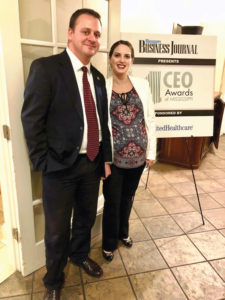 Since moving to Greenville six years ago, Christensen and his wife, Melia, have had three children—Marianna, five, Martin, two, and Makenna, one—all born at DRMC. “Melia and I are partners in life and without her, managing my responsibilities would be much more difficult,” Christensen says.
Since moving to Greenville six years ago, Christensen and his wife, Melia, have had three children—Marianna, five, Martin, two, and Makenna, one—all born at DRMC. “Melia and I are partners in life and without her, managing my responsibilities would be much more difficult,” Christensen says.
Christensen got his degree at the University of Illinois Urbana-Champaign. Early on, he dedicated himself to proving himself by building his resume and climbing the ladder in the business of healthcare.
“Hospitals are often the largest employers in the area, and have a serious economic impact,” Christensen says. “I like the business side of things. I like running a business. What a tremendous bonus to do it in an industry with such a huge impact. If I can apply the business mindset to healthcare, hopefully that has a downstream impact on taking care of people in the right way.”
He credits his parents, Bruce and Diane Christensen, with teaching him personal responsibility and the tools that allowed him to go out and earn his way. With his family still in Illinois, Christensen says it is tough raising three kids without any grandparents around. But, he says, the warm relationships they enjoy in the Delta help a lot.
“What we found is the community has really embraced us and brought us in as part of their family,” Christensen says. “We are really thankful for our friends here, and couldn’t do it without them.”
He started out as an unpaid intern in a hospital in Illinois. Throughout his career, his effort has been to get his foot in the door.
“Just give me a job,” Christensen says. “Once I get in there, I’m going to do the job the best I can. I’ve tried over my career to take on more and more responsibilities. A lot of times, there are things people don’t want to do. I just go in and tackle the challenges. I think that is one of the reasons for my success.”
He also has tried to learn everything he could from other healthcare leaders. He learned from mentors and then crafted his own style.
A high priority is to focus on employees.
“Reinvesting in our employees in whatever way possible has been a tremendous key to our success the past few years,”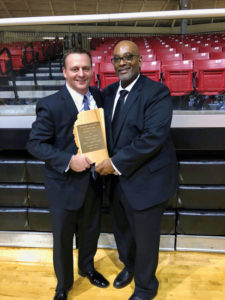 he says. “We could talk about clinical service lines, advanced procedures we do, and growing the hospital in this market. But I firmly believe the things we have done for our employees the past few years have trumped all the rest.”
he says. “We could talk about clinical service lines, advanced procedures we do, and growing the hospital in this market. But I firmly believe the things we have done for our employees the past few years have trumped all the rest.”
When he first came to DRMC, employees had gone five-six years with no raises. The first year a stronger financial situation allowed DRMC to give a three percent raise. The second year, employees received a two percent raise plus some extra vacation. The third year they were able to give employees a two percent raise along with more vacation.
“That is something we are really proud of,” he says. “There aren’t many hospitals out there able to do these things. I read every week about a hospital that is either closing, threatening to close, or laying people off. I’m up to speed on national trends; there are significant layoffs in the healthcare industry, not just in the Delta. If we are able to invest back in people, that is really important.”
Other actions to benefit employees include offering a retail pharmacy that allows employees to get discounts, and a strong focus on wellness.
“The community becomes healthier if our employees become healthier,” Christensen says. “Whether it is employee pay and benefits, or overall health and wellness, I really want to make this place known as a hospital that takes care of our people. When we take care of our employees, they are going to take care of our patients.”
Another goal is to make this a place doctors want to work. DRMC has a strong physician recruitment effort. “The more we can recruit doctors and the more we make this a place doctors want to practice medicine, the more we will succeed,” he says.
Christensen has worked to improve the public hospital’s financial stability. When he first arrived, the hospital had $25 million and fifty days of reserve on hand. Now the hospital has been able to grow to $60 million and 180 days of cash on hand.
“We’ve achieved some of the most positive net incomes and financial metrics in the history of this organization,” he says. “We are proud of where we are financially.”
DRMC is the safety net hospital for many in the Delta.
“Our mission is real,” Christensen says. “We live it every day. What worries me is this traditional problem of healthcare costs in an economically stressed area. That is why it is imperative to focus on preventative healthcare. We need to move care to a cheaper setting, and try to get people to take care of themselves before it escalates to a chronic and costly situation.”
Plans are to aggressively move forward on outpatient services.
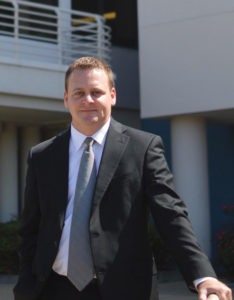 “Outpatient medicine is the name of the game,” Christensen says. “The majority of our business is outpatient. When you start to think along the lines of how to keep patients out of the hospital, it goes against the traditional business model. The hospital traditional model is sick care and reactive; a preventive posture is where we need to be. We need to invest in outpatient models while maintaining a high level of acute care. The challenge for me is making sure we are aligning old traditional payment models with a new strategy and approach. We are no longer planning to build a new hospital here, but we do have plans to build the biggest outpatient center in the Delta.”
“Outpatient medicine is the name of the game,” Christensen says. “The majority of our business is outpatient. When you start to think along the lines of how to keep patients out of the hospital, it goes against the traditional business model. The hospital traditional model is sick care and reactive; a preventive posture is where we need to be. We need to invest in outpatient models while maintaining a high level of acute care. The challenge for me is making sure we are aligning old traditional payment models with a new strategy and approach. We are no longer planning to build a new hospital here, but we do have plans to build the biggest outpatient center in the Delta.”
Christensen said unless all the healthcare providers in the Delta work together, they will all shrink.
“We really care about a true collaboration with all the other healthcare providers in the Delta,” he says. “Think of it in business terms such as taking advantage of economies of scale. If we can partner with other hospitals, we will be successful. We are committed to finding solutions mutually beneficial to them and us. We are already reaching out to other communities across the Delta to explore where we can cooperate, and do things really well so people stay in the Delta to have procedures rather than traveling to Jackson or Memphis.”
Another focus is to make sure that people appreciate the economic impact of the hospital. That includes understanding that the hospital has a very diverse employment base. Only about half of employees are doing clinical work. There are jobs in information technology, medical billing, maintenance, food service and much more.
People also need to recognize that healthcare providers are continually being asked to do more with less.
“That is just a fact,” Christensen says. “In my opinion, healthcare is under attack in a myriad number of ways ranging from payment reductions to increased regulations. But in order for a healthcare executive to be successful, you must not be in a victim mentality. Yes, the job gets harder, but what could be more noble? It is hard job in a demanding industry, but it is what I signed on for.”

